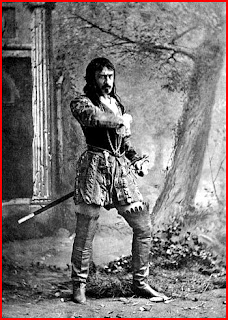Iago Stands for the Motive-Hunting of Motiveless Malignity
Iago,
the Italian Machiavellian stereotype of the evil man who enjoys doing evil for
its own sake, is the villain of Shakespeare’s famous tragedy Othello. Iago is
an artist in love with villainy which is his sole profession. His diabolical
nature, his innate love of wickedness is the real basis of his villainy. Even
if the motives which he advances had not been there, he would have hunted for
other motives to justify his action to himself. When he finds people favored by
fortune, and exalted above himself, he cannot endure it and so he proceeds to
crush them.
Iago
knows that Othello by virtue of his constant loving and noble nature, will
prove to Desdemona a most dear husband. He confesses that he too loves
Desdemona but this is not love but a kind of repressed lust. He suspects
Othello of making love to his wife Emilia and also suspects that Cassio has
made love to Emilia. He, therefore, hatches conspiracies to destroy both Cassio
and Othello, and accuses Cassio, Desdemona and Othello in turn of infidelity. His
almost insane desire to do evil is well expressed in his own words: “Knavery’s
plain face is never seen till used.”
There
is a continual struggle going on in Iago much against his will, he realizes
that certain other people are really good, and he despises them for it, and yet
cannot help occasionally contrasting them with himself. He says of Cassio, ‘He
hath a daily beauty in his life/That makes me ugly’. Thus Iago has very little
motivation for his evil behavior. When Iago describes his forthcoming evil acts
in his soliloquies we see the image of an Iago as an evil spider ensnaring the innocent and helpless fly: for example,
in Act II, Scene I upon seeing Desdemona touch Cassio’s palm, Iago brags, ‘with
as little a web as this will I ensnare as great a fly as Cassio’.
Iago
is confident from the beginning in his ability to make Desdemona look guilty,
even though he does not know how. The drop of the handkerchief is a grand
accident which he fully uses to his purpose to make Desdemona guilty of
infidelity to her husband. Iago is indeed a scheming, yet a fascinating
character who seems to have certain human characteristics such as the extreme
enjoyment of his evil acts, his logical development of a foundation to arouse
Othello’s jealous suspicion. '
Critics have debated on
Iago’s motivation for several centuries and the arguments still continue. In
any case, Iago is cunning, crafty, hypocritical, malicious, demonic, covetous
and harmful but he is undoubtedly intellectual and intelligent. In fact,
Shakespeare conceives of a monster, whose wickedness should lie far deeper than
anything that could be explained by a motive.


It is a nice review on iago stands for motive hunting aslo really helpful.
ReplyDeletewonderful solution
ReplyDelete